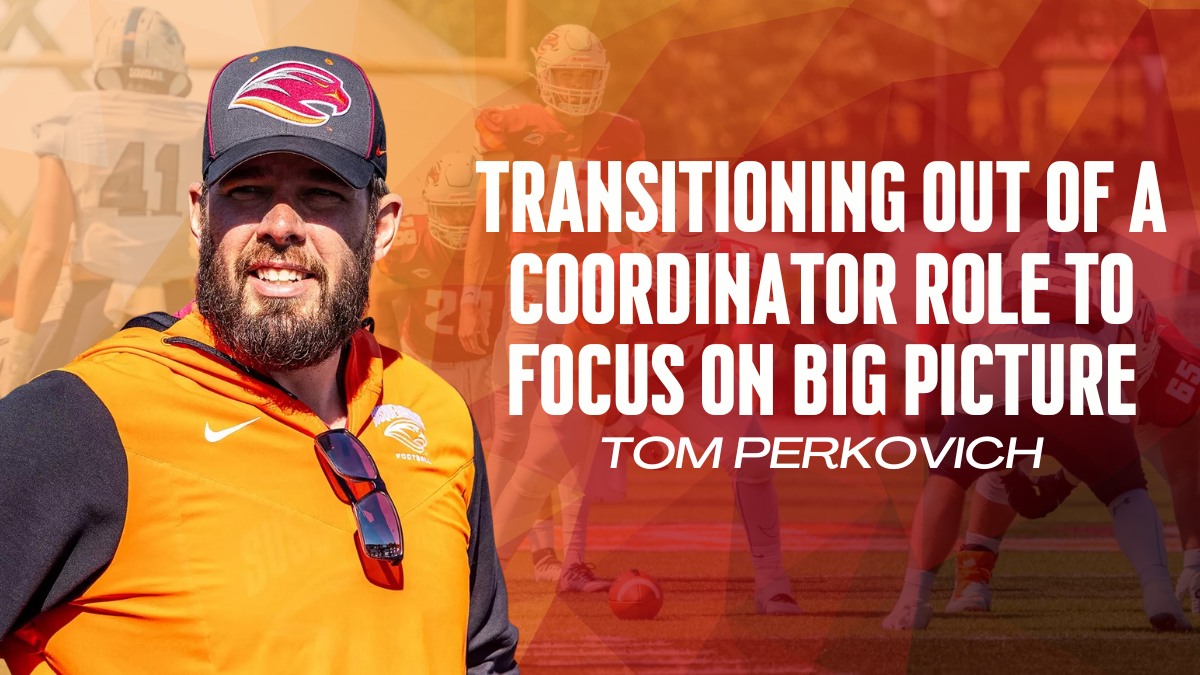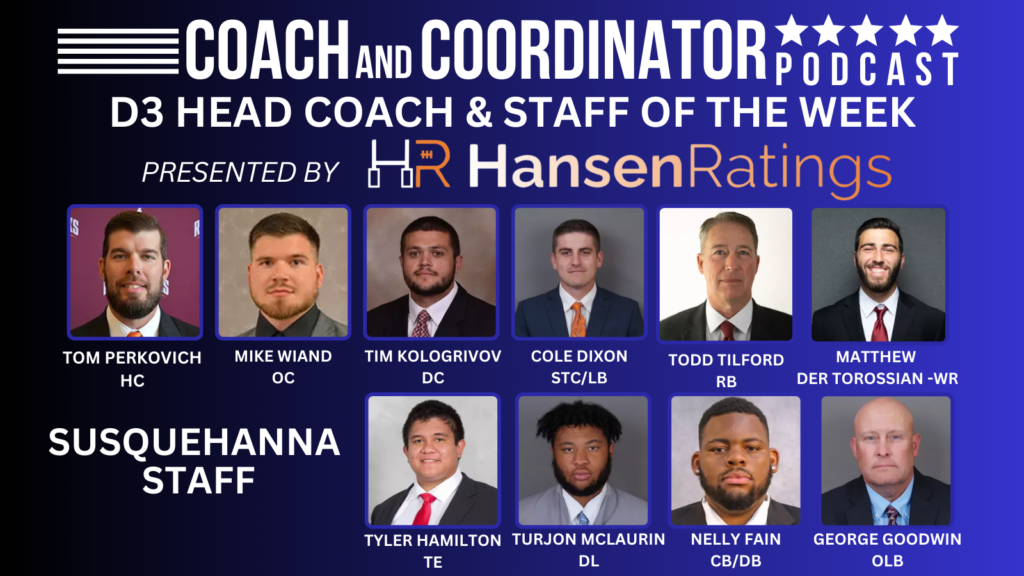
Transitioning leadership within a coaching staff is a careful process that requires strategic planning, mentorship, and trust. Coach Tom Perkovich of Susquehanna University provides a masterclass in this approach, sharing his experiences as he transitioned play-calling duties to his offensive coordinator, Mike Wiand. His insights reveal a practical, effective pathway to preparing assistant coaches for expanded roles.
Recognize the Right Moment for Transition
For Coach Perkovich, the timing was everything. His decision to delegate play-calling duties stemmed from both personal growth and the needs of the program. As he explained:
“I felt like it was time for me to be able to help as we transitioned late in the summer on the defensive side and all the pieces that had to move there.”
Recognizing when it’s time to step back and allow others to step up is a reflective process for a head coach. This awareness not only benefits the team but also strengthens the overall structure of the coaching staff.
Implement a Gradual Handoff of Responsibilities
Transitioning leadership isn’t an overnight process. Instead, Coach Perkovich took a phased approach, allowing his assistant to grow into the role over time:
“A few years ago, I was letting [Mike Wiand] call all of our developmental part of practice… And then two seasons ago, I allowed him to, even in the game planning part of it, he called third down in ’22 and ’23.”
By giving incremental responsibilities in low-pressure scenarios like practice and specific (though high pressure) game situations, Coach Perkovich ensured that his assistant gained the confidence and experience needed for success.
Maintain Open Communication and Provide Support
A supportive environment is key to any leadership transition. Coach Perkovich emphasized the balance between providing guidance and allowing autonomy:
“I didn’t want to micromanage him. I didn’t want to second guess every call… There have been times where I’ve stepped in and said, ‘Hey, I want to run this,’ or I’ve called the play or two, yeah, but my biggest worry, right, is just you have the title, you’re the guy calling it, but, you know, the guy that just got done calling it is like calling every other play.”
This approach created a space where his assistant could make decisions, learn from them, and establish his own identity as a play-caller.
Encourage Continuous Learning and Development
For Coach Perkovich, leadership doesn’t stop at delegation—it includes allowing a culture of growth. He actively invested in his staff’s professional development:
“We went out to five or six different staffs in our area and sat down and spent time and spent the money, you know, to be honest, out of fundraising to learn and get better as a staff.”
This commitment to continuous learning not only enhances the skills of individual coaches but also strengthens the program as a whole.
Cultivate a Culture of Trust and Empowerment
Empowering assistant coaches to make their own decisions is a cornerstone of effective leadership. Coach Perkovich explained:
“I think you have to let the play caller kind of have his identity and what he wants to do.”
By trusting his assistant to develop his style and make decisions, Coach Perkovich fostered an environment where his staff felt confident and capable.
Step Back to Focus on Big-Picture Leadership
Finally, Coach Perkovich’s transition allowed him to focus on broader program management and problem-solving on game days:
“As a head coach, right, your job on game day is to solve the problem.”
Freed from the intense focus of play-calling, he could address issues as they arose, support players and other coaches, and keep the program aligned with its overall vision.
Making Hard Decisions
Coach Perkovich’s approach to transitioning leadership within his staff is a model for any head coach seeking to build a resilient, forward-thinking program. By recognizing the right moment, implementing a gradual handoff, maintaining open communication, encouraging growth, and fostering trust, head coaches can prepare their assistants for expanded roles while elevating the entire team.
As Coach Perkovich puts it:
“Sometimes it’s hard to do, but sometimes you’ve got to make those hard decisions.”
Indeed, it’s these decisions that set the foundation for sustained success.
D3 Head Coach and Staff of the Week
For their efforts in a Week 11 win over Lycoming, Coach Perkovich and his staff were recognized as the D3 Head Coach and Staff of the Week presented by Hansen Ratings. Coach Perkovich is assisted by Mike Wiand, Tim Kologrivov, Cole Dixon, Todd Tilford, Matthew DerTorossian, Tyler Hamilton, Turjon McLaurin, Nelly Fain, and George Goodwin.
Notable Stats
Susquehanna 55-0 vs. Lycoming
- Outgained Lycoming 572 to 238 & nearly tripled up YPP, 9.4 vs. 3.7
- Only punted once.
- Perfect 6-for-6 scoring TDs in Red Zone
- Had a 250-yard passer, 150-yard rusher, 99-yard receiver
- Allowed 2.3 yards per rush and 4.9 yards per dropback.



